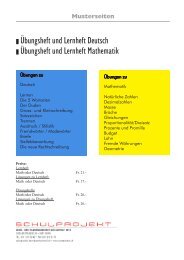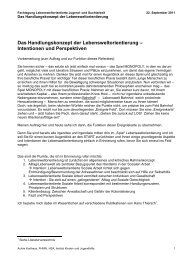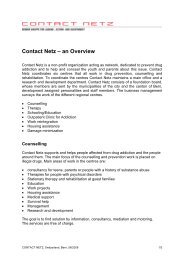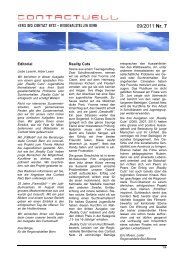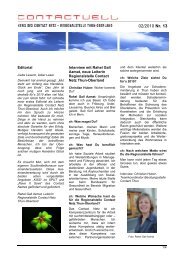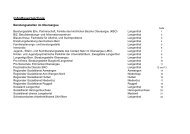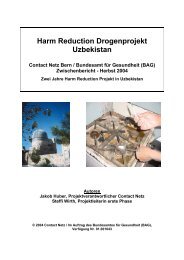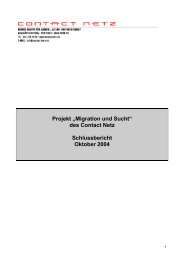Harm Reduction Drug Project Uzbekistan - Contact Netz
Harm Reduction Drug Project Uzbekistan - Contact Netz
Harm Reduction Drug Project Uzbekistan - Contact Netz
You also want an ePaper? Increase the reach of your titles
YUMPU automatically turns print PDFs into web optimized ePapers that Google loves.
6.3.4 NGOs and their contribution to a process of democratisation<br />
This project, with its organisation and basic orientation, operates in an area which<br />
presents no small problem to the Uzbeks. From the beginning, the ideas of working<br />
through NGOs and of outreach work were new and were radical and difficult for the<br />
Uzbek ministries to accept. The objectives of working closely with the drug addicts<br />
and keeping organisational costs as low as possible, require a disciplined approach<br />
to tasks and the handling of finances which is not customary in Central Asia in any<br />
area of work. Placing responsibility for the project in the hands of NGOs makes an<br />
active contribution to a process of de-bureaucratisation and democratisation in<br />
<strong>Uzbekistan</strong> today. Close and careful co-operation with ministry officials, and<br />
between the NGOs and the ministries, is therefore even more important. Without<br />
these so-called strategic levels - based in the Steering Committee - the project and<br />
all those involved would soon find themselves sinking in the harsh realities of the<br />
outside world. It is precisely this combination of field work with the target group and<br />
management by the NGOs that has led to the success of Swiss drug policy and<br />
efforts to combat drug abuse. It would be unthinkable today to expect government<br />
officials to have the necessary direct contacts with drug addicts on the street and<br />
where they live, not least because the addicts themselves do not trust government<br />
agencies.<br />
6.3.5 <strong>Drug</strong> policy and efforts to combat drug abuse: a difficult learning<br />
process<br />
We in Switzerland are also familiar with heated debates about how to deal with the<br />
drug problem. Whatever the assessment of the situation, the drug policy and the<br />
preferred approach, in this area it is natural to keep discussing the same basic<br />
questions – “What should we do?“, “What direction should we take?“, “Would it not<br />
be better to encourage abstinence?“. The Swiss four-pillar model, which has today<br />
gained supporters among Uzbek professionals, administrators and policymakers, is<br />
based on the conviction that only through an interdisciplinary and integrated<br />
approach is it possible to tackle the drug problem thoroughly and effectively, and<br />
to make it part of normal institutional practice. The greatest challenge for Central<br />
Asia and <strong>Uzbekistan</strong> is for existing institutions (administration, healthcare system<br />
etc.) to change direction, rethink their policies and learn new ways. This project<br />
must and will, particularly because it is independent of institutions, set an example<br />
in the areas of healthcare and law enforcement, showing what procedural changes<br />
are necessary if we are to deal effectively with the burning problems of drug<br />
addiction and HIV.<br />
6.3.6 Risks and opportunities in relation to staff and the social context<br />
Our experience shows that flexibility and perseverance, combined with specialist<br />
work to increase awareness about drug policy, and to improve relationships, can<br />
keep the project on course. As mentioned above however, every personnel change<br />
in one of these areas of work, where so much depends on individuals, brings with it<br />
the danger that what has been accomplished will be lost, or, at the very least, will<br />
be seriously set back. Continuity of personnel, and long-term stability in the<br />
carefully developed Uzbek-Swiss network are key elements in the success or<br />
failure of this project.<br />
As well as the drug policy, the social context in which the project has to operate in<br />
<strong>Uzbekistan</strong> and Central Asia is another important factor in its effectiveness and in<br />
achieving its objectives. It is clear that the overall situation has deteriorated in<br />
recent years. Moreover, the terrorist attacks of the past few months have refocused<br />
the attention of the Uzbeks and changed their priorities from what they were when<br />
the project was launched.<br />
24<br />
Importance of<br />
NGOs and<br />
outreach work<br />
Challenge to<br />
change existing<br />
institutions<br />
Stability of<br />
personnel key<br />
elements in the<br />
success or<br />
failure<br />
Worsening<br />
socio-political<br />
context





